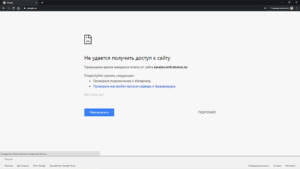There's nothing more annoying than a page that won't load. This can cause loss of visitors, lower site rankings, and loss of revenue. In this article, we'll look at the top five causes of page loading issues and how you can fix them.
- 1. Slow hosting. Slow hosting can be the reason for slow page loading speed. If your website is stored on a slow server, then it can cause a lot of page loading problems. To fix this problem, you can contact your hosting provider and ask them to increase the server speed or switch to another, faster hosting.
- 2. Incorrectly optimized images. Images can slow down page loading if they are not optimized correctly. If the images are too large, they may take a long time to load. To fix this problem, you need to optimize your images, compress them, and use formats that take up less space.
- 3. Unoptimized code. The page code may not be written optimally, which can slow down loading. For example, using too many JavaScript or CSS files can cause problems. To fix this problem, you need to reduce the number of files, compress them, and optimize the code.
- 4. Broken link. A broken link may cause problems loading the page. If there are links on a page that point to non-existent pages, this can cause a 404 error and slow down loading. To fix this issue, you need to check all the links on the page to make sure they are working correctly.
- 5. Browser Issues: Some browsers can cause page loading issues. If you have problems loading pages on a particular browser, it may be due to its settings or version. To fix this issue, update your browser or try using a different one. ConclusionPage loading is an important element of a website that can affect its success. But with proper optimization and troubleshooting, you can make your page faster and perform better.
- 1. Problems with Internet connection
- 2. Insufficient RAM and computer power
- 3. Problems with the browser and settings
- 4. Presence of viruses and other malware
- 5. Server side problems
- How to solve page loading problems
- 1. Check the operation of the Internet connection and settings
- 2. Optimize your computer and browser
- 3. Scan your computer for viruses
- 4. Contact technical support
- 5. Try using a different browser or device
1. Problems with Internet connection
One of the main reasons why pages won't load is problems with your Internet connection. This can be caused by various factors such as poor connection with your ISP, low Wi-Fi signal, or faulty router.
If you are having problems loading pages, the first thing you should do is check your Internet connection. To do this, you can use online connection speed tests or simply try opening another site.
If the problem really is with the connection, then you need to check that all cables are connected correctly and there are no unnecessary blockages in the router settings. If this does not help, then it is worth contacting your provider to find out possible problems on their side.
It's important to remember that even if you're using a wired connection, a poor Wi-Fi connection can also affect the speed and stability of your connection. If you're using a wireless connection, try restarting your router or moving closer to it to get a better signal.
In general, if you encounter problems loading pages, then first of all you need to check your Internet connection, and then look for other reasons.
2. Insufficient RAM and computer power
If your computer is running slowly and pages take a long time to load, it may be due to insufficient RAM and computer power. If you open many browser tabs, run multiple programs at once, or work with large files, your computer may not be able to handle the load.
To speed up your computer, you can try the following recommendations:
1. Increase the amount of RAM. The more RAM, the faster the computer runs. If you have little RAM, you can install additional modules.
2. Optimize program loading. If you run many programs at the same time, your computer may become slow. Try limiting the number of programs that start when your computer starts.
3. Clean your hard drive. If your hard drive is low on free space, your computer may run slowly. Remove unnecessary files and programs to free up hard drive space.
4. Install a faster processor. If your computer is running slowly, it may be due to a weak processor. Try installing a more powerful processor.
By following these recommendations, you can speed up your computer and fix problems loading pages in your browser.
3. Problems with the browser and settings
If you encounter problems loading pages in your browser, the problem may be related to the settings of the browser itself. Some browsers may block some page elements, such as images or scripts, from loading if the appropriate security settings are set.
It's also possible that you have too many browser extensions or plugins installed, which could be overloading your browser and slowing down page loading. It is recommended to disable unnecessary extensions and plugins to speed up your browser.
If you use antivirus software, it may also block pages from loading if it detects viruses or other malware on them. It is recommended to check your antivirus settings and, if necessary, temporarily disable it to check.
Finally, there may be a problem with the settings of the Internet provider or the network from which you are connected to the Internet. It is recommended to contact your provider's technical support or network administrator to check the settings and possible problems.
In any case, if the problem with loading pages persists, it is recommended to seek help from specialists or conduct additional diagnostics and configuration of your device and network.
4. Presence of viruses and other malware
One of the reasons why pages may not load could be due to the presence of viruses and other malware on your device. Many viruses can slow down your Internet browser or block access to certain sites.
To protect against viruses and other malware, it is recommended that you install antivirus software on your device and update it regularly. You should also avoid visiting suspicious sites and not opening attachments in emails from unknown senders.
If you have already noticed the presence of viruses on your device, you need to scan and remove viruses using antivirus software. It is also recommended to change passwords for accounts and bank cards to prevent theft of personal data.
5. Server side problems
The reason that pages are not loading may be problems on the server side. This can happen if the server is overloaded, unavailable, or unstable. In such cases, the user may experience long delays in loading the page or even no page loading at all.
If you find that pages are not loading on multiple sites, the problem may be with your internet connection. However, if the problem only occurs on one site, then the problem is most likely on the server side.
To find out what exactly is happening, you can use special tools that allow you to check the accessibility of the site and its loading speed. For example, Pingdom and GTmetrix services can help you determine whether a site is stable and fast.
If the problem is on the server side, then solving it may require some technical skills. For example, you may need to restart the server or configure its operating parameters. If you do not have sufficient knowledge in this area, then it is best to turn to specialists.
In any case, if you encounter problems loading pages, don't panic. Most often, the problem is solved quickly enough and without much effort. The main thing is to correctly identify its cause and take timely measures to eliminate it.
How to solve page loading problems
Why aren't the pages loading? This is a question that worries many Internet users. Some page loading problems may be caused by browser glitches, poor internet connection, or server-side issues. In any case, there are several ways to help solve page loading problems.
1. Check your Internet connection. If you have low internet speed or network problems, pages will take longer to load. Try rebooting your modem or router to resolve any problems.
2. Clear your browser cache. The browser cache contains temporary files that can slow down page loading. Clearing your browser cache will help speed up page loading times.
3. Disable extensions and plugins. Some extensions and plugins can slow down your browser and page loading. Try disabling them and see if pages load faster.
4. Use a different browser. If page loading problems persist, try using a different browser. The problem may not be with the page itself, but with your current browser.
5. Contact support. If all of the above methods do not help, contact your ISP support. Perhaps the problem with loading pages is related to the server.
By following these tips, you can solve page loading problems and enjoy a comfortable browsing experience.
1. Check the operation of the Internet connection and settings
The first step if you have problems loading a page should be to check the functionality of your Internet connection and settings. To do this, you can do the following:
1. Check if the device is connected to a Wi-Fi network or wired Internet.
2. Reboot the router and modem.
3. Check your firewall and antivirus program settings; they may be blocking access to the site.
4. Clear your browser cache and temporary files, as they can slow down the Internet.
5. Try visiting other sites to make sure that the problem is not related to just one specific resource.
If after performing all these steps the problem still persists, you should contact your Internet provider or computer technicians for help.
2. Optimize your computer and browser
One of the reasons for problems loading pages may be suboptimal operation of the computer and browser.
To optimize your computer's performance, it is recommended to regularly clean it of unnecessary files and programs. It is also important to check the system for viruses and update drivers for computer components.
As for the browser, you can use special extensions to optimize its performance. For example, AdBlock allows you to block ads on web pages, which makes them load faster. Another useful extension is OneTab, which compresses open tabs into one, thereby saving computer resources.
You should also check your browser settings. Some settings may slow it down. For example, having your browsing history saved may slow down page loading.
In general, optimizing your computer and browser allows you to load pages faster and reduce the likelihood of problems.
3. Scan your computer for viruses
Viruses can be one of the reasons why pages do not load. They can slow down your computer, block access to certain sites, or redirect to other pages. To avoid such problems, you need to regularly scan your computer for viruses.
There are many antivirus programs that can help protect your computer from malware. Some of the most popular programs include McAfee, Norton, and Avast. Choose the program that best suits your needs and install it on your computer.
After installing the program, you need to perform a full scan of your computer. This may take several hours, depending on the size and number of files on your computer. After the scan is completed, the program will display a report on the viruses found and offer to remove them.
Remember that regularly scanning your computer for viruses is an important part of protecting your computer and data. Scan at least once a month to protect your computer and ensure the safety of your personal data.
4. Contact technical support
If none of the previous solutions helped, then perhaps the problem lies with the site itself. In this case, you should contact technical support. Typically, the site has contact information where you can find a phone number or email for support.
When contacting technical support, you must describe the problem in as much detail as possible and provide all the necessary data, such as browser type, operating system version, etc.
d. Technical support will help you understand the causes of the problem and offer an appropriate solution.
It is important to remember that technical support works for the benefit of users, and its task is to help solve problems that arise. Therefore, do not be afraid to ask for help if you encounter difficulties while working with the site.
5. Try using a different browser or device
If pages don't load in your current browser or device, try using a different browser or device. Some sites may not work correctly on a particular browser or device. Try opening the page in another browser, such as Google Chrome, Mozilla Firefox or Safari. If the page loads in a different browser, the problem may be related to your current browser.
If the page doesn't work on your computer, try opening it on another device, such as your smartphone or tablet. If the page loads on another device, the problem may be with your computer or its settings.
If the page still doesn't load after trying other browsers or devices, the problem may be with the site itself. In this case, you can contact the site's support service or try loading the page later.
Read further:






